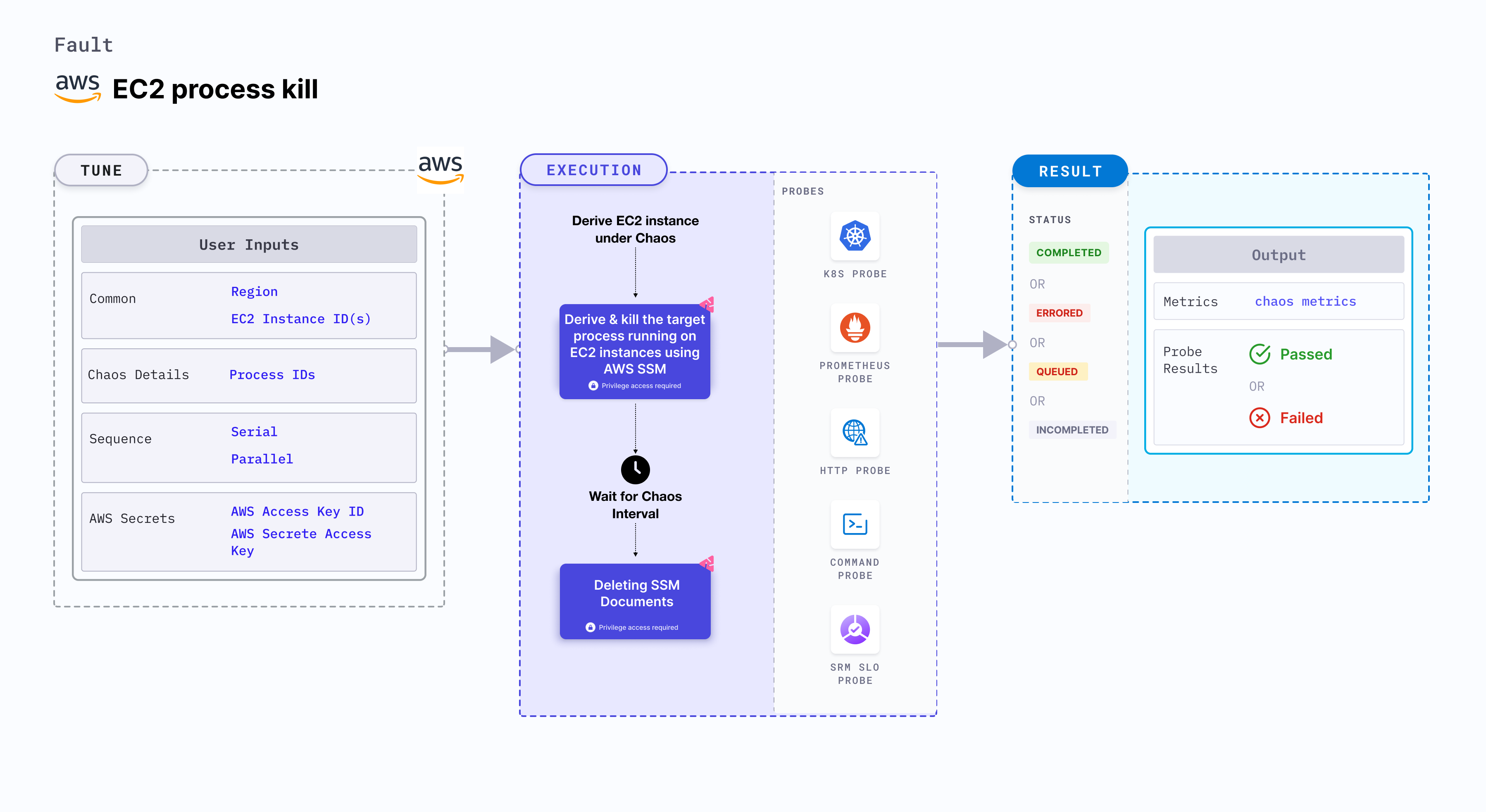EC2 process kill
Introduction
EC2 process kill fault kills the target processes running on an EC2 instance. This fault disrupts the application critical processes such as databases or message queues running on the EC2 instance by killing their underlying processes or threads.

Use cases
EC2 process kill determines the resilience of applications when processes on EC2 instances are unexpectedly killed (or disrupted).
note
- Kubernetes version 1.17 or later is required to execute the fault.
- The EC2 instance should be in healthy state
- The target processes should exist in the VM.
- SSM agent is installed and running in the target EC2 instance.
- The Kubernetes secret should have the AWS Access Key ID and Secret Access Key credentials in the
CHAOS_NAMESPACE. Below is the sample secret file:apiVersion: v1
kind: Secret
metadata:
name: cloud-secret
type: Opaque
stringData:
cloud_config.yml: |-
# Add the cloud AWS credentials respectively
[default]
aws_access_key_id = XXXXXXXXXXXXXXXXXXX
aws_secret_access_key = XXXXXXXXXXXXXXXXXXXXXXXXXXXXXXXXXXXX - We recommend you use the same secret name, that is,
cloud-secret. Otherwise, you will need to update theAWS_SHARED_CREDENTIALS_FILEenvironment variable in the fault template, and you won't be able to use the default health check probes. - Go to the common tunables to tune the common tunables for all the faults.
- Go to AWS named profile for chaos to use a different profile for AWS faults and the superset permission/policy to execute all AWS faults.
Below is an example AWS policy to execute the fault.
{
"Version": "2012-10-17",
"Statement": [
{
"Effect": "Allow",
"Action": [
"ssm:GetDocument",
"ssm:DescribeDocument",
"ssm:GetParameter",
"ssm:GetParameters",
"ssm:SendCommand",
"ssm:CancelCommand",
"ssm:CreateDocument",
"ssm:DeleteDocument",
"ssm:GetCommandInvocation",
"ssm:UpdateInstanceInformation",
"ssm:DescribeInstanceInformation"
],
"Resource": "*"
},
{
"Effect": "Allow",
"Action": [
"ec2messages:AcknowledgeMessage",
"ec2messages:DeleteMessage",
"ec2messages:FailMessage",
"ec2messages:GetEndpoint",
"ec2messages:GetMessages",
"ec2messages:SendReply"
],
"Resource": "*"
},
{
"Effect": "Allow",
"Action": [
"ec2:DescribeInstanceStatus",
"ec2:DescribeInstances"
],
"Resource": [
"*"
]
}
]
}
Fault tunables
Mandatory tunables
| Tunable | Description | Notes |
|---|---|---|
| EC2_INSTANCE_ID | ID of the target EC2 instance. | For example, i-044d3cb4b03b8af1f. |
| REGION | The AWS region ID where the EC2 instance has been created. | For example, us-east-1. |
| PROCESS_IDS | Process IDs of the target processes provided as comma-separated values. | For example, 183,253,857. |
Optional tunables
| Tunable | Description | Notes |
|---|---|---|
| TOTAL_CHAOS_DURATION | Duration that you specify, through which chaos is injected into the target resource (in seconds). | Defaults to 30s. |
| RAMP_TIME | Period to wait before and after injecting chaos (in seconds). | For example, 30 |
Process IDs
Target process IDs running on a particular EC2 instance.
The following YAML snippet illustrates the use of this environment variable:
# Process kill running on EC2 instance
apiVersion: litmuschaos.io/v1alpha1
kind: ChaosEngine
metadata:
name: engine-nginx
spec:
engineState: "active"
chaosServiceAccount: litmus-admin
experiments:
- name: ec2-process-kill
spec:
components:
env:
# List of Process IDs
- name: PROCESS_IDS
value: '8688,4678'
- name: EC2_INSTANCE_ID
value: 'instance-1'
- name: REGION
value: 'us-west-2'